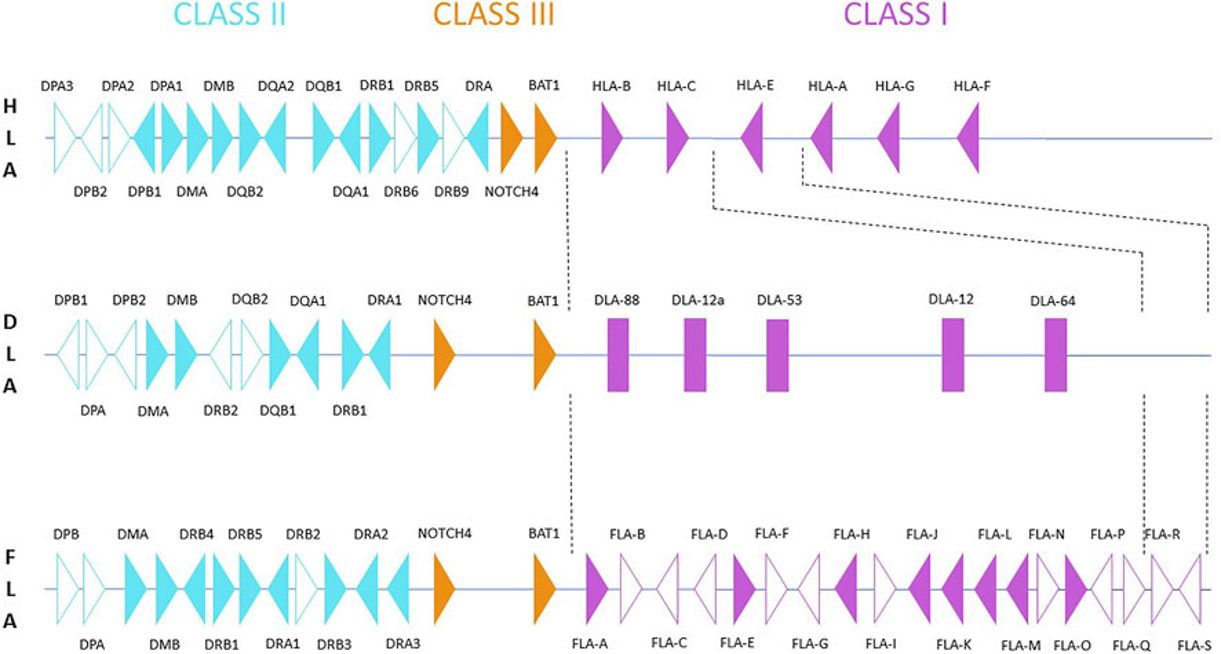With unrivaled expertise and experience in various immunotherapy discovery and development, Creative Biolabs is confident in providing an integrated solution for dog DLA genotyping service to best suit your program requirements.
The dog leukocyte antigen (DLA) system contains many functional genes of the immune system, thus making it a candidate region for involvement in immune-mediated disorders. Many studies have illuminated there are many important associations between specific DLA class II haplotypes and dog immune diseases, such as hemolytic anemia, thyroiditis, and immune polyarthritis. What is more, the DLA polymorphism information could be used in biomedical research of regeneration medicine for human MHC-related diseases.
Compared with human HLA, the DLA genomic region is located on chromosome 12, besides the divergent DLA class I gene DLA-79 located on chromosome 18. The major DLA genomic regions on chromosome 12 include three transcribed DLA-class I genes (DLA-88, DLA-12, and DLA-64) and four DLA-class II genes (DLA-DR, DLA-DQ, DLA-DM, and DLA-DO) and DLA-class III genes. The class I and class II molecules expressed as cell surface glycoproteins are involved in antigen presentation to T cells. While class III molecules are irrelevant to class I and class II molecules structurally and functionally. Almost all somatic cells expressed the class I antigens, whereas class II molecules are expressed on antigens-presenting cells such as macrophages. Interestingly, compared to mice and human, dog class II molecules are present on almost all lymphocytes.
 Fig.1 Schematic comparison of the Felis catus MHC region located on chromosome B2 and compared with the human (HLA) and canine (DLA) MHC regions.1
Fig.1 Schematic comparison of the Felis catus MHC region located on chromosome B2 and compared with the human (HLA) and canine (DLA) MHC regions.1
Histocompatibility typing or identifying which alleles are present is important not only for organ transplantation but also for studying disease association. To study the complexity of DLA polymorphism, Creative Biolabs provides high-quality, one-stop NGS-based DLA genotyping services to help our client meet program requirements. We are dedicated to providing more comprehensive and targeted accurate genotyping analysis results and facilitating scientific research. And our scientists and technicians are experienced in every step with high dedication to ensuring accurate outcomes.
Creative Biolabs' scientists are dedicated to bringing together years of valuable experience to help our clients shorten the clinical study journey. We are committed to the DLA genotyping service and dedicated to reducing the overall project development timeline for our clients.
For more details of our DLA genotyping service, please visit our web for more information. To request other genotyping services, please reach out to our scientists to learn how we can be involved in your project.
Reference
For any technical issues or product/service related questions, please leave your information below. Our team will contact you soon.
All products and services are For Research Use Only and CANNOT be used in the treatment or diagnosis of disease.
 NEWSLETTER
NEWSLETTER
The latest newsletter to introduce the latest breaking information, our site updates, field and other scientific news, important events, and insights from industry leaders
LEARN MORE NEWSLETTER NEW SOLUTION
NEW SOLUTION
CellRapeutics™ In Vivo Cell Engineering: One-stop in vivo T/B/NK cell and macrophage engineering services covering vectors construction to function verification.
LEARN MORE SOLUTION NOVEL TECHNOLOGY
NOVEL TECHNOLOGY
Silence™ CAR-T Cell: A novel platform to enhance CAR-T cell immunotherapy by combining RNAi technology to suppress genes that may impede CAR functionality.
LEARN MORE NOVEL TECHNOLOGY NEW SOLUTION
NEW SOLUTION
Canine CAR-T Therapy Development: From early target discovery, CAR design and construction, cell culture, and transfection, to in vitro and in vivo function validation.
LEARN MORE SOLUTION